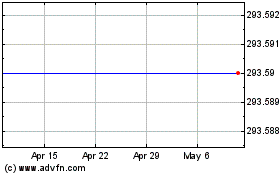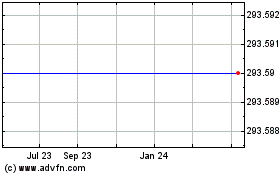White House Moves To Avert Freight-Rail Strike
October 07 2011 - 1:49PM
Dow Jones News
The White House stepped into an impasse between major freight
railroads and labor unions, attempting to avert a potential strike
as early as December.
The Obama administration appointed a "presidential emergency
board" Thursday to resolve stalled contract talks that began in
early 2010 and cover about 94,000 workers, or roughly two-thirds of
the industry's unionized employees.
More than 30 railroads are involved, including the Class I
railroads of Warren Buffett's Burlington Northern Santa Fe; Union
Pacific Corp. (UNP); Kansas City Southern (KSU); Norfolk Southern
Corp. (NSC); and CSX Corp. (CSX).
A strike is still viewed as unlikely, but the prospect of a
disruption of freight shipments during the holiday season has
raised the stakes. Industry officials say a strike would cost $2
billion a day.
"Freight rail is vital to our economy and our future," President
Barack Obama said in a statement. "It's in our national interest to
make sure our freight rail system runs smoothly, since a disruption
could affect businesses across the country and cause unnecessary
damage to our already-fragile economy."
The five-member board will hear arguments from each side and
then recommend contract terms within 30 days. The parties will then
have 30 days to review the recommendations and work out a deal, or
a strike could occur.
Railroads and the industry's largest union, the United
Transportation Union, representing about 40,000 employees, reached
a tentative deal this summer that the industry wants to serve as a
model for contracts with the other unions.
The remaining unions rejected an offer that would have increased
wages by 17% over six years, said the National Carriers' Conference
Committee, representing railroads in the talks.
"These robust increases are exceptional, especially in an
economy that has seen real hourly earnings decrease 1.5% over the
last year," A. Kenneth Gradia, the committee's chairman, said in a
statement. "They're particularly generous given that railroad
employees are already among the highest compensated workers in the
United States."
Union representatives couldn't immediately be reached for
comment.
The Transportation Communications International Union said in
June that the railroads' proposal would include insufficient wage
increases and unfairly shift health-care costs to employees.
"We believe that 17% in wage increases over six years is not a
fair settlement in light of the carriers' record profitability, nor
do we accept the need for the radical restructuring of our health
plan," Robert A. Scardelletti, the union's national president, said
in a statement at the time.
The last freight-rail strike occurred over two days in 1992, a
spokeswoman for the rail committee said.
-By Josh Mitchell, Dow Jones Newswires; 202-862-6637;
joshua.mitchell@dowjones.com
Kansas City Southern (NYSE:KSU)
Historical Stock Chart
From Mar 2024 to Apr 2024

Kansas City Southern (NYSE:KSU)
Historical Stock Chart
From Apr 2023 to Apr 2024
